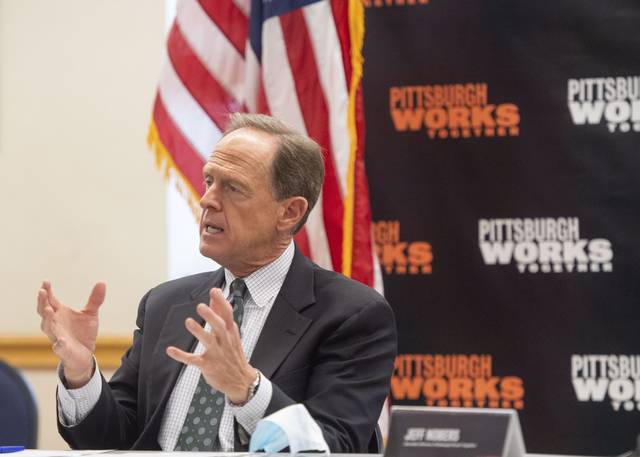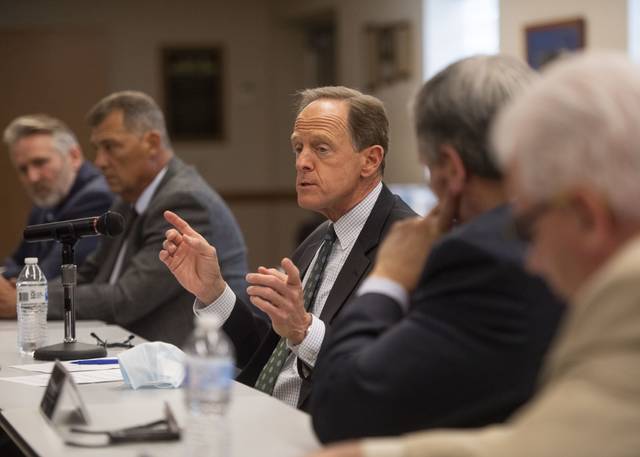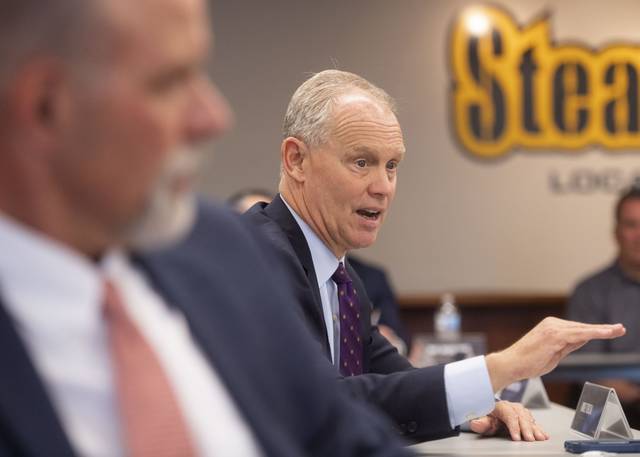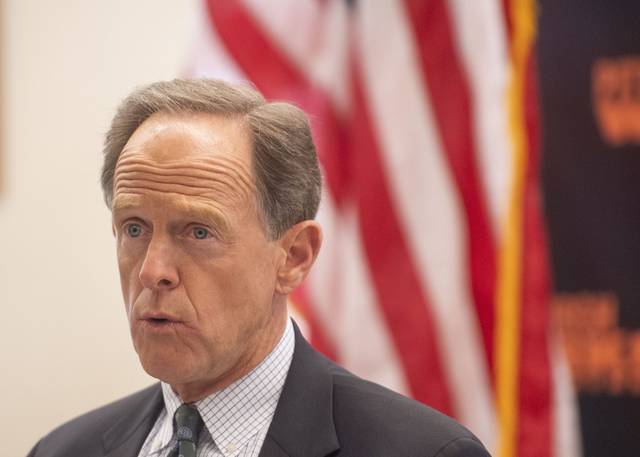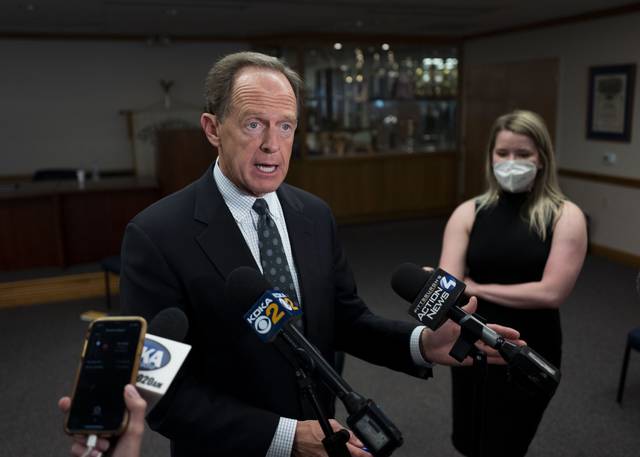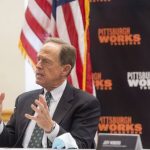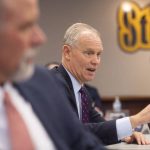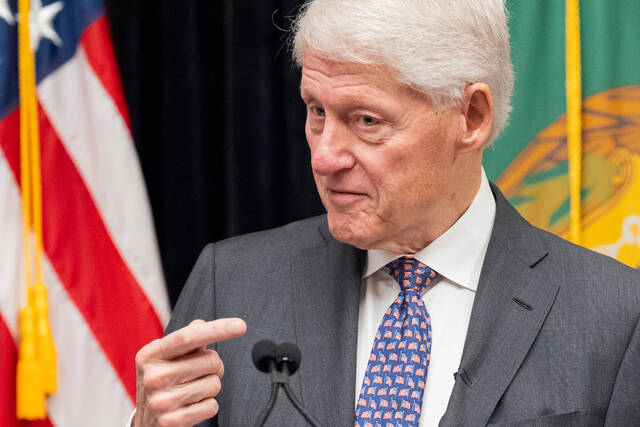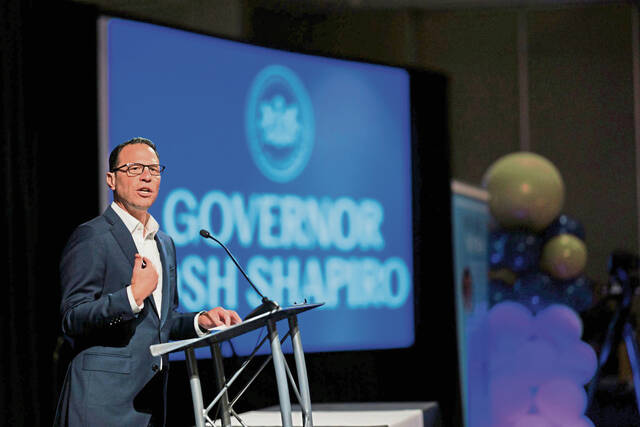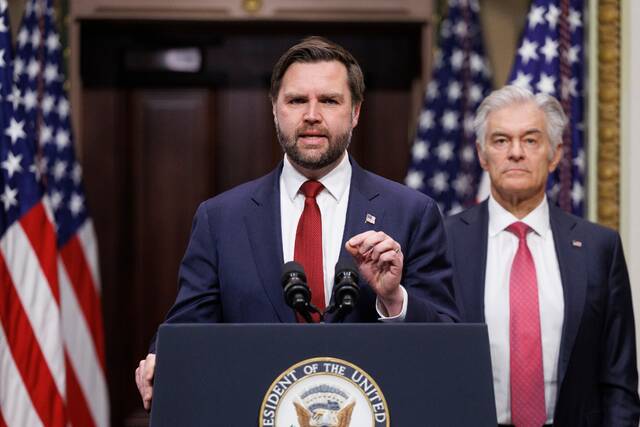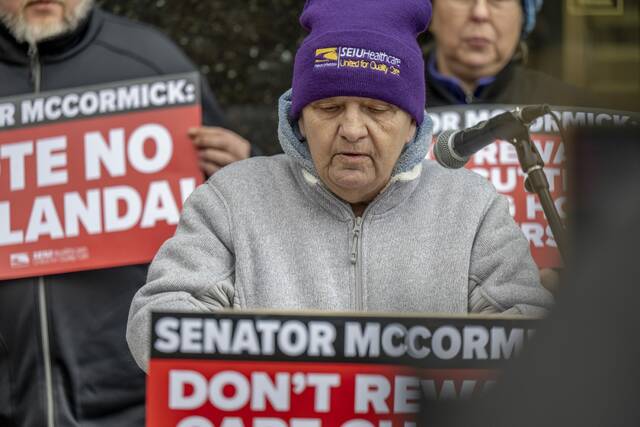U.S. Sen. Pat Toomey said Wednesday that he wants to get to the bottom of why U.S. Steel nixed its planned $1.2 billion Mon Valley Works project last week, even as indicators point to the pandemic-battered economy “roaring back” and bipartisan support builds for a nationwide infrastructure infusion.
“Steel prices are at a record high, demand is strong, the economy is growing, infrastructure is all anybody is talking about, and we’ve got this great facility that has already made a big investment that is going to lead to some of the cleanest steel in the world. What happened? That’s the question,” Toomey, a Lehigh Valley Republican, said during a forum of labor and business leaders in Pittsburgh.
”I don’t want to jump to any conclusions until I feel like I’ve got a better understanding of what was the thought process there, what was the decision-making process.”
Toomey spoke about his concerns during a visit to the Local 449 Steamfitters union hall in the city’s Duquesne Heights neighborhood. The event was hosted by Pittsburgh Works, an organization that aims to foster collaboration among local labor and industry leaders across the steel, energy and manufacturing sectors. Its membership spans unionized workers in construction, steel, electrical, plumbing and other industries, local chambers of commerce, trade groups and companies such as CNX, Range Resources and Peoples Gas.
Loss of ‘a golden opportunity’
Much of the informal conversation during the sit-down forum of about a dozen participants was dominated by U.S. Steel yanking its local investment — and an estimated 1,000 new construction jobs and protection for 3,000 steelworker jobs that would have come with it.
“Our members are coming to us asking what happened with U.S. Steel and, quite frankly, we don’t have an answer,” said Greg Bernarding, business manager for Iron Workers Local No. 3. “And I don’t think anyone is going to know if they weren’t sitting at the table when that decision was made.
“You can blame it on the environmentalists, the far left. … Maybe U.S. Steel just wants to take it south where there’s less regulation or cheaper costs, we don’t know.”
Scott Roy, vice president of natural gas company Range Resources, said the unexpected withdrawal of U.S. Steel from the Mon Valley upgrades after years of anticipation “rings all too familiar to many of us,” questioning why a region poised for growth “keeps losing out on promising development.”
In 2019, leaders across Western Pennsylvania pointed to U.S. Steel’s planned investment as one that would bring job security and ensure jobs for future generations of steelworkers. Plans included a new continuous casting and rolling facility at the Edgar Thomson Plant in Braddock and a cogeneration facility at the Clairton Plant — all projected then to be online by next year.
“We lost a golden opportunity for investment,” said Jeff Nobers, executive director of Pittsburgh Works.
Nobers accused local elected officials and business development groups of bowing to “factually suspect attacks” by environmental groups and “an activist health department.” Nobers blamed not the regulations required for U.S. Steel’s upgrades but rather the regulatory process and delays in issuing the necessary permits.
Allegheny County Health Department officials have pushed back against the idea that permitting delays are to blame and said that it worked “proactively to move this project along.”
Environmental advocacy group reactions have been mixed. Penn Environment, for instance, lauded the decision to shut down three batteries at the Clairton plant, whereas The Breathe Project denounced U.S. Steel’s move away from an investment that would have reduced emissions in the Mon Valley and surrounding areas.
“We have to do a better job,” said Chris Geronimis, business manager for the International Union of Painters and Allied Trades District Council 57. “Our members, they feel like they’re getting squeezed on both sides, from the right and from the left. They just want people to work together to get things solved for them. This is just another example of how not working together leads to bad things. Give us some hope.”
Toomey: ‘I’m not sure who to blame for this’
Toomey said he found U.S. Steel’s decision to cancel the Mon Valley upgrades to be “very, very disappointing.” His staff has had preliminary conversations with U.S. Steel officials, and Toomey plans to speak to a senior-level executive by phone “very soon.”
“It certainly seemed like a great project that had a lot of things going for it,” Toomey said. “Honestly, I’m not sure who to blame for this, and that’s why I’m asking questions.”
The senator’s goal during the call: “to find out if there’s something that’s broken that needs to be fixed.”
“I’ll be asking them to explain what happened here, why did this look like a good project two years ago, and then two years later it’s all over?” Toomey said. “Was there a reason that could have been prevented? Because this would have been really good for this region. It’d have been good for Pennsylvania.”
Toomey’s visit marked the latest event hosted by Pittsburgh Works, which began its work bringing together labor, private sector and government leaders shortly before covid-19 struck Pennsylvania last year.
Like prior events organized by the group, such as the visit by former Trump administration Energy Secretary Dan Brouillette to discuss the natural gas industry, Wednesday’s forum did not amount to “a lovefest of any political party, per se,” Nobers said.
“There were some very straightforward comments made and some questions asked, and you heard a few people mention, ‘Look, we’re just sick of all the fighting,’ ” he said. “We can all sit here pointing fingers at each other over it. What we really need to do now is find, if we can, a common ground. Maybe what was missing in this whole U.S. Steel thing — the missing leg in the labor-management scenario — is government.”
Aside from lamenting the loss of the U.S. Steel upgrades, forum participants pleaded with Toomey to make progress advancing an infrastucture package in Congress.
“When you talk to the president next week, maybe you can start that communication as far as the bipartisanship, and hopefully he’ll listen,” Bernarding said to Toomey. “Because I know, as well as everyone in this room does, about the amount of dilapidated bridges and the roadways that we have. … Is it going to take a catastrophe for everyone to wake up and realize that we need to fix this?”
GOP ‘willing to work’ with Biden on infrastructure
Toomey expressed optimism that a bipartisan agreement on infrastructure spending is within reach. He pointed to at least five times that Congress has united to pass bipartisan legislation needed urgently this past year, including a series of coronavirus relief packages.
“So I think we’ve demonstrated we can work together,” Toomey said.
Like many fellow Republicans, however, Toomey opposes the size and scope of the legislative proposal pitched by President Biden and Democratic leaders. They’ve rejected Biden’s approach to pay for a slew of non-traditional infrastructure projects, such as efforts to expand access to broadband internet, the electric grid, clean water and affordable housing.
“Let’s not damage the economy with a tax increase, and let’s not launch a whole bunch of new programs that have nothing to do with infrastructure,” Toomey said. “Where the common ground is, is actual infrastructure. It’s roads and bridges and highways and airports and all of the things that we understand are infrastructure, and there is bipartisan support for that. That’s the opportunity for the administration.”
On Tuesday, Senate Minority Leader Mitch McConnell, R-Kentucky, said Republicans are willing to spend up to $600 billion on infrastructure, far less than Biden’s proposed $2.3 trillion package.
Meanwhile, said Toomey, Democrats “have their own internal problems in getting something done,” such as mixed views on whether to go after rolling back 2017 tax cuts and increasing taxes on corporations as part of the infrastructure package. Toomey said he’d like to see Biden focus on advancing the roughly one-third of his proposal that already has support from both parties.
“If the president is willing to work with us,” said Toomey, “there will be more than 10 (Senate) Republicans that will work with him.”
RELATED: In Pittsburgh visit, Biden unveils $2 trillion American Jobs Plan


